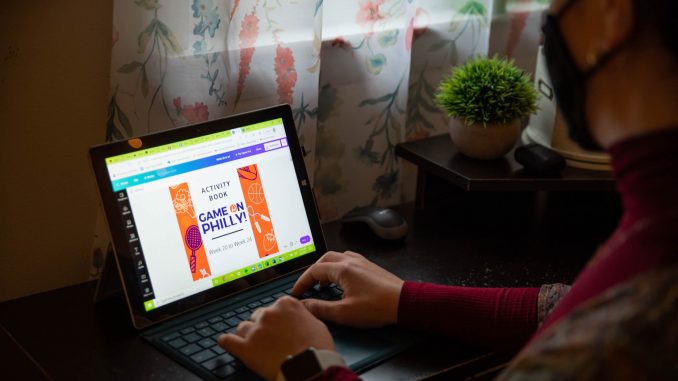
Whether a student enjoys hockey, yoga, tennis or a game of freeze-tag, the Game on Philly app has an exercise video ready for them.
Temple University faculty and students from the School of Sport, Tourism and Hospitality Management and the College of Public Health are helping with the Game on Philly app, a children’s fitness app launched in October 2020 by the Philadelphia Youth Sports Collaborative. Students and faculty track user experiences, deliver meal kits and sports equipment to users’ homes and develop fitness and nutrition goals on the app.
The app is available on the app store for users over the age of 13. On the app, users sign up for teams based on their school or athletic organization. They can follow along with exercise videos and nutritional guidance videos to earn points that can increase their rank and win prizes.
Game on Philly has two fitness programs available to 12 schools in the Philadelphia area, one using self-guided activities on the app, and another utilizing Zoom sessions with health coaches and activity booklets, said Anna Woolslager, a research assistant at the Center for Obesity Research and Education in CPH.
For self-guided activities, Temple students deliver sports equipment to users’ homes every five to six weeks, and for those participating in Zoom sessions, they deliver sports equipment and meal kits with ingredients for recipes in the activity booklets, she added.
The Game on Philly app is designed to improve students’ mental well-being and help them stay healthy and prevent obesity while schools and sports recreation centers remain closed due to COVID-19, said Mike Barsotti, the member services and outreach manager at PYSC.
“As a parent, you probably don’t feel great about the kids just cruising YouTube and you know, going around to any old video,” Barsotti said. “We thought, ‘What if we can streamline that process? What if we can make access a lot easier and really simplify it?’”
When children rejoin in-person sports, the app can be used for supplemental exercise activities when they cannot meet with coaches or sports teams, Barsotti said.
“Now your coach is able to say, ‘Hey, check out our channel on the Game on Philly app,’ and you can then see like a bunch of workouts you could do in between practices or skills you can practice on your own,” he added.
The Game on Philly project began on March 2, 2020, as a partnership between Temple and PSYC through funding from a federal Youth Engagement in Sports grant. It was started as a 12-week in-person, outdoor, after-school program for middle schoolers to learn about sports and nutrition, The Temple News reported.
In-person aspects stopped that month because of the COVID-19 pandemic, leading the team to create the Game on Philly app during the next seven months, said Gareth Jones, a sport and recreation management professor and a lead principal investigator for Game on Philly.
“Once that change in modality occurred, [the app] became kind of front and center,” he added. “It’s designed to essentially in many ways kind of replicate what the program was trying to do.”
The Game on Philly partnership is a three-year program funded through a yearly grant from the Office on Women’s Health, said Emily DeSabato, the program manager for youth engagement in sports initiative at PYSC.
Paul L. Dunbar School on 12th Street between Cecil B. Moore and Montgomery avenues was scheduled to start using the Game on Philly program in person in March 2020, but COVID-19 canceled the program before any students participated, said Toni Ingram, the health and physical education instructor at Dunbar.
Students in sixth, seventh and eighth grades were given the option to participate in the Zoom-based program starting in Summer 2020, and about 15 middle school students attend the Zoom sessions Monday through Thursday, Ingram said.
“They like it, they’re learning different activities,” Ingram said. “They’re in the house so much, but so they’re getting some sort of physical activity.”
The Temple research evaluation team of CPH students and faculty talks to parents and users of the Zoom-based and self-guided programs of Game on Philly to analyze participants’ physical health progress, said Gina Tripicchio, a social and behavioral sciences professor and a lead investigator for the app.
Moraine Yala Kisenda, a senior biology major, is a research assistant surveying participants’ behavioral responses to the physical activities and parents’ thoughts about the program.
The optional surveys ask parents and children questions related to dietary and behavioral changes since the start of the participants’ engagement in the program, Tripicchio said.
“It’s been really interesting and fun being able to talk with parents and the students,” Kisenda said. “They ask really important questions about lifestyle, nutrition, health and activity and things like that.”
Woolslager develops goal incentives, like water bottles and backpacks when children complete their tasks, and nutritional guidance for students in the printed activity booklets, which have recipes and nutrition information that complement the physical activities in the booklets, she said.
“I’m really excited to see where it takes Philadelphia because our end goal is to have every child provided resources to attain a healthy and happy lifestyle,” she said.


Be the first to comment